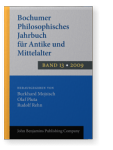Das Lachen der thrakischen Magd
Über die ›Weltfremdheit‹ der Philosophie
The laughter of the Thracian handmaid. About the ›unworldliness‹ of philosophy. Interpreting Plato’s story of the Thracian handmaid, this essay focuses on questions concerning the supposition of an opposition between common sense and philosophical thinking. Taking the laughter of the maid seriously the author discusses the role of laughter for Plato’s approach. By reevaluating the function of laughter she argues for its strength in revealing ideological thinking or an undisclosed hypothesis, and in enabling philosophical thinking. Thus, the author argues that the alliance of laughter and thinking unsettles the state of being enclosed in ideology, everydayness or thoughtlessness, and both distances and unsettles human beings. And hence, it may free us to pose again the question as to how we are thinking what.
Article language: German
Cited by (2)
Cited by two other publications
Korf, Benedikt
2019.
Schwierigkeiten mit der kritischen Geographie.
Geographica Helvetica 74:2
► pp. 193 ff.

Korf, Benedikt
2024.
After Critique: Cynicism, Scepticism and the Politics of Laughter.
Theory, Culture & Society 41:4
► pp. 95 ff.

This list is based on CrossRef data as of 4 october 2024. Please note that it may not be complete. Sources presented here have been supplied by the respective publishers.
Any errors therein should be reported to them.
